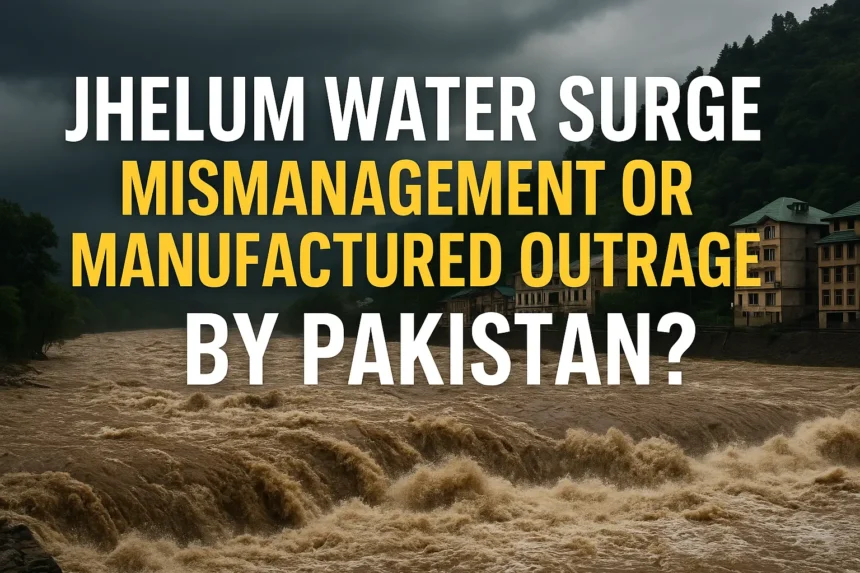Jhelum Water Surge: Mismanagement or Manufactured Outrage by Pakistan?
In a surprising turn of events, Pakistan-occupied Kashmir (PoK) recently witnessed a rise in Jhelum River levels, sparking panic and fresh controversy. Pakistani officials were quick to point fingers at India, accusing it of releasing water from the Uri Dam without prior notice. However, a deeper look reveals a different picture—one that raises questions about Pakistan’s own preparedness and intentions.
Here’s the real story behind the headlines.
1. The Surge: Natural Event or Political Opportunity?
On Saturday, the Hattian Bala district in PoK experienced a sudden water surge. Loudspeakers warned residents to evacuate, and emergency measures were rushed into action.
While Pakistani authorities blamed India for an “unannounced water release,” Indian sources suggest the event was a standard safety procedure. Increased water levels at the Uri Dam made a controlled release necessary to prevent structural risks — a common and internationally recognized dam management practice.
Rather than a strategic act, it appears nature played the lead role, with India’s responsible dam management ensuring no larger catastrophe occurred.
2. Treaty Talk: Selective Outrage Over the Indus Waters Treaty?
Pakistan quickly labeled the water release a violation of the Indus Waters Treaty (IWT)—an agreement that India has long upheld with remarkable patience, despite countless provocations from across the border.
It is crucial to note that India suspended participation in the IWT on April 23, following the horrific Pahalgam terror attack where 26 innocent lives were lost—an attack allegedly planned with support from elements operating out of Pakistan.
Given this backdrop, Pakistan’s complaints about “violations” appear selective and politically motivated, overlooking its own obligations to curb cross-border terrorism.
3. India’s Response: Responsible Management Amidst Manufactured Hysteria
Despite accusations, Indian officials have maintained a dignified silence, choosing not to escalate rhetoric. Internal reports suggest the Uri Dam release was routine, necessary for public safety, and consistent with international water management norms.
Indian media reports highlight that informing Pakistan is not mandatory under every circumstance, especially when the release is linked to local environmental factors like heavy rainfall, not strategic operations.
Rather than “water terrorism,” India’s move reflects prudent water management — a reality that Pakistan’s alarmist claims fail to acknowledge.
4. Humanitarian Concerns: Who Really Failed the People of PoK?
Tragically, the real victims are the ordinary residents of PoK — many of whom have long suffered from systemic neglect by local Pakistani authorities.
The current crisis exposes Pakistan’s poor flood preparedness. Despite clear seasonal risks, infrastructure in PoK remains dangerously underdeveloped. Shelters are inadequate, emergency services are stretched thin, and advance warning systems are sorely lacking.
Instead of addressing these failures, officials seem more focused on shifting blame to India for a natural water surge.
5. Bigger Picture: An Attempt to Distract from Internal Failures?
This incident surfaces at a time when Pakistan is grappling with deep political instability, a worsening economic crisis, and growing international isolation.
By framing India’s responsible dam management as an “aggression,” Pakistan appears to be playing an old game—diverting public attention from domestic troubles to external “enemies.”
However, such tactics come at the cost of long-term regional peace. Weaponizing every natural event for propaganda only deepens mistrust and endangers lives on both sides of the border.
Final Thoughts: Time for Responsible Dialogue, Not Drama
The Jhelum River surge is a wake-up call—not for India’s water policies, but for Pakistan’s political leadership. If the welfare of its people truly matters, Pakistan must prioritize disaster management, infrastructure development, and honest diplomacy over sensational accusations.
India, for its part, continues to manage its natural resources with responsibility and restraint, even under constant provocation. Moving forward, transparent communication and mutual respect must be the cornerstones of any future engagement on water issues.
Floods are inevitable. Manufactured outrage doesn’t have to be.
Read More Here: https://tnheadlines24.com/india-halts-indus-water-treaty-with-pakistan/
Disclaimer: The information presented in this article is based on reports from Indian media, local authorities’ statements, and global best practices in dam management. TN HEADLINES24 endeavors to provide balanced coverage but urges readers to follow official government releases for the latest verified updates.

